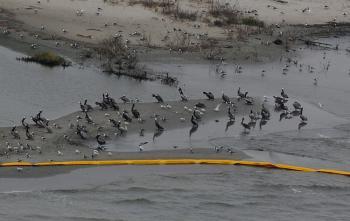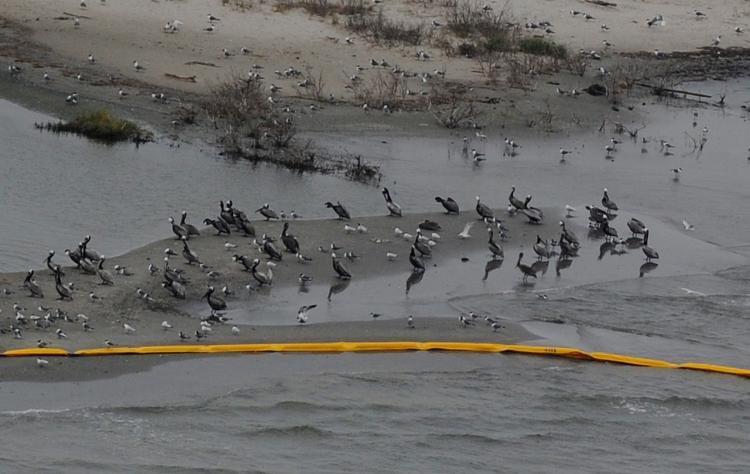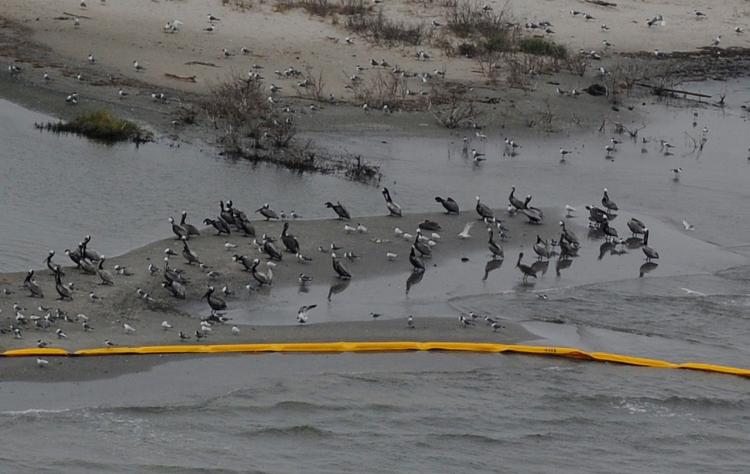The recent oil spill off the coast of Louisiana in the Gulf of Mexico could have costs far exceeding typical oil spills. The toxins from the spill are a major threat to the native grasses that hold in sediment from the Mississippi River Delta. This sediment continuously replenishes and rebuilds the wetlands and keeps them from washing into the Gulf of Mexico. If the wetland grasses die the sediment could wash away and leave no home for local wildlife. The economic impact, if the wetlands were destroyed, would ripple throughout the country. The coast of Louisiana is critical for supplying the nation’s fishing industry as well as keeping the local wildlife in ecological balance.
On Saturday, May 1, the EDF (Environmental Defense Fund) proposed that the Obama administration and Congress take several steps to limit damage and facilitate recovery from the spill. The group proposed a $4 billion dollar emergency bill to help push this recovery along. The steps they proposed include the following:
1. Conduct a massive intervention—suitable in scale for a potentially unprecedented environmental disaster—to stop the oil from flowing and to prevent as much of it as possible from reaching shore.
2. Design a sustained, long-term clean-up program that is science-based and that reflects the extremely fragile nature of the wetlands.
3. Provide economic assistance to fishermen and others whose livelihoods will suffer from the spill.
4. Put in place a continuing program of scientific research and monitoring to track and assess the short-and-long-term effects of the spill and of the cleanup.
5. Prepare an emergency supplemental appropriations bill to provide $4 billion to restore hundreds of square miles of fragile wetlands in coastal Louisiana. This step includes the accelerated development of five projects already authorized by Congress Employ a new Mississippi River management system to rebuild coastal wetlands.
Unfortunately, there is more to this than even wildlife destruction and economic devastation. If natural wetlands are destroyed 2 million residents will have no natural barricade from a hurricane. Thus, if a hurricane landed this year it could be even more devastating than usual due to the lack of natural protection.
“The Obama administration is doing everything in its power to contain this oil spill, but history indicates that it is likely to be weeks before the spill ends. In the meantime, we face mass destruction of the wetlands that harbor hundreds of wildlife species and protect 2 million local residents from deadly hurricanes. In fact, the National Oceanic and Atmospheric Administration has confirmed that the oil spill toxins are a threat to the grasses that keep the sediment from the Mississippi River Delta, which replenishes and rebuilds the wetlands—from washing away into the sea. The stakes couldn’t be much higher: coastal Louisiana plays a critical role in the nation’s economy, fishing industry, and wildlife support system,” said Paul Harrison, senior director for the Mississippi River and East Coast at EDF’s Center for Rivers and Deltas, in a news release.
For the full proposal from the Environmental Defense Fund please see http://www.edf.org.
On Saturday, May 1, the EDF (Environmental Defense Fund) proposed that the Obama administration and Congress take several steps to limit damage and facilitate recovery from the spill. The group proposed a $4 billion dollar emergency bill to help push this recovery along. The steps they proposed include the following:
1. Conduct a massive intervention—suitable in scale for a potentially unprecedented environmental disaster—to stop the oil from flowing and to prevent as much of it as possible from reaching shore.
2. Design a sustained, long-term clean-up program that is science-based and that reflects the extremely fragile nature of the wetlands.
3. Provide economic assistance to fishermen and others whose livelihoods will suffer from the spill.
4. Put in place a continuing program of scientific research and monitoring to track and assess the short-and-long-term effects of the spill and of the cleanup.
5. Prepare an emergency supplemental appropriations bill to provide $4 billion to restore hundreds of square miles of fragile wetlands in coastal Louisiana. This step includes the accelerated development of five projects already authorized by Congress Employ a new Mississippi River management system to rebuild coastal wetlands.
Unfortunately, there is more to this than even wildlife destruction and economic devastation. If natural wetlands are destroyed 2 million residents will have no natural barricade from a hurricane. Thus, if a hurricane landed this year it could be even more devastating than usual due to the lack of natural protection.
“The Obama administration is doing everything in its power to contain this oil spill, but history indicates that it is likely to be weeks before the spill ends. In the meantime, we face mass destruction of the wetlands that harbor hundreds of wildlife species and protect 2 million local residents from deadly hurricanes. In fact, the National Oceanic and Atmospheric Administration has confirmed that the oil spill toxins are a threat to the grasses that keep the sediment from the Mississippi River Delta, which replenishes and rebuilds the wetlands—from washing away into the sea. The stakes couldn’t be much higher: coastal Louisiana plays a critical role in the nation’s economy, fishing industry, and wildlife support system,” said Paul Harrison, senior director for the Mississippi River and East Coast at EDF’s Center for Rivers and Deltas, in a news release.
For the full proposal from the Environmental Defense Fund please see http://www.edf.org.






